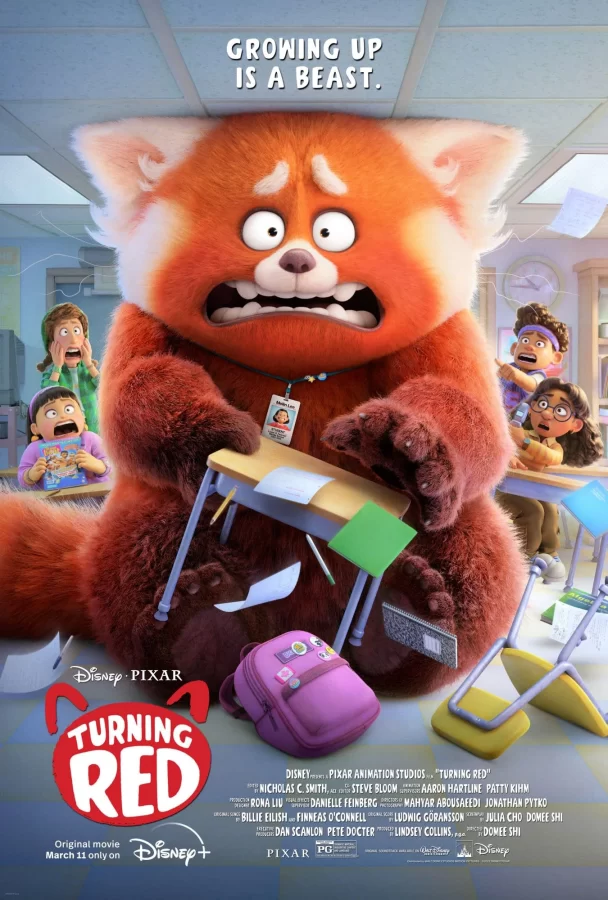Turning Red is Pixar’s newest film. Its initial release date was on February 21, 2022. It hit Disney Plus on March 11, 2022. The film has been facing unnecessary backlash from parents, claiming it is “inappropriate” for younger viewers. Nonetheless, the film can be beneficial for young children, especially young girls, to watch.
About Turning Red
Turning Red has made history by being the first Pixar film directed by an Asian woman, Domee Shi. The film follows Meilin, a thirteen-year-old Chinese-Canadian girl who has to learn to face puberty and family expectations. An ancestral ability to turn into a red panda when facing negative emotions causes uproar in Meilin’s life. She suddenly has to learn how to keep herself from becoming the panda, while also going through her daily life.
This PG-rated film covers many topics such as puberty, menstruation, and the expectations that are often held in Asian communities. It also shows the idea of womanhood and depicts strong female characters.
The Backlash
While receiving a 95% on rotten tomatoes, the audience score is only 72%. Many viewers of the movie are claiming that because it’s specific towards certain groups of people, it’s unrelatable. Others are claiming it’s inappropriate for including discussions on menstruation and using language such as “sexy” and “stripper.”
The film shows Meilin’s disobedience towards her mother-which is a crucial aspect of puberty. The idea of becoming independent is leaving many parents upset. Others also claim that showing girls having crushes on boys is inappropriate as well.
Sexism underlying the backlash
A common trait in all the backlash towards Turning Red is that it is too mature for younger viewers and is not a family-friendly movie. In fact, most of the backlash is over the fact that it demonstrates puberty, more specifically- female puberty.
The idea that menstruation and puberty for girls are inappropriate creates a stigma. This film is one of the few that truly shows how difficult adolescence can be for young women on their mental and physical health. It is also one of the few that accurately presents what it’s like to be a thirteen-year-old girl.
Mrs. Melissa Abrams, English teacher and mother to a pre-teen daughter, stated, “By the age of seven, parents should be talking to their children about sex and if they have daughters, discussions about menstruation should also begin.”
Movies that present boys having crushes are “acceptable.” However, the minute a film targeting girls does it, it’s seen as disgraceful or cringe. This double standard is creating unnecessary backlash for Turning Red.
Ashley Massano, a senior at Colonia High School, says that the film was accurate to what her adolescence was like. She claims, “The movie broke boundaries, stereotypes, and common misconceptions of how girls should act.”
She praises Pixar for showing what it’s like to be a growing teenage girl, “From crushes, first periods, impressing their elders, and conflicts in friendships; these are all things I went through during my adolescence and still am going through. It was nice to see what often isn’t shown.”
People have also compared the film to other Disney and Pixar movies, claiming that it should be more like the classics. However, in almost all Disney films, traumatic events such as war, murder, family dying, and worse have occurred. Disney and Pixar films show more in-depth depictions of romance than Turning Red.
Final thoughts
As a teenage girl, it was refreshing to see a film that accurately depicted what my adolescence was like. From the way the girls talk, to the discussions on mental health and menstruation, this film portrays the true essence of puberty in a way no film has done before- especially those from Disney or Pixar.
It’s infuriating to see all the negativity surrounding it, particularly on things that I have experienced as a teenager. The plot and theme should not be automatically criticized because it is only relatable to a certain group. It’s important to show representation in films that make certain groups of people feel seen- not everything needs to be generalized.
One does not need to relate to a film to enjoy it. It’s impossible for everyone to connect with every movie made. It’s crucial for everyone to watch and appreciate films like Turning Red so stigmas, stereotypes, and shame around girls’ adolescence can be ended.
There’s no shame in having periods, crushes, and becoming independent. There is no shame in growing up.












